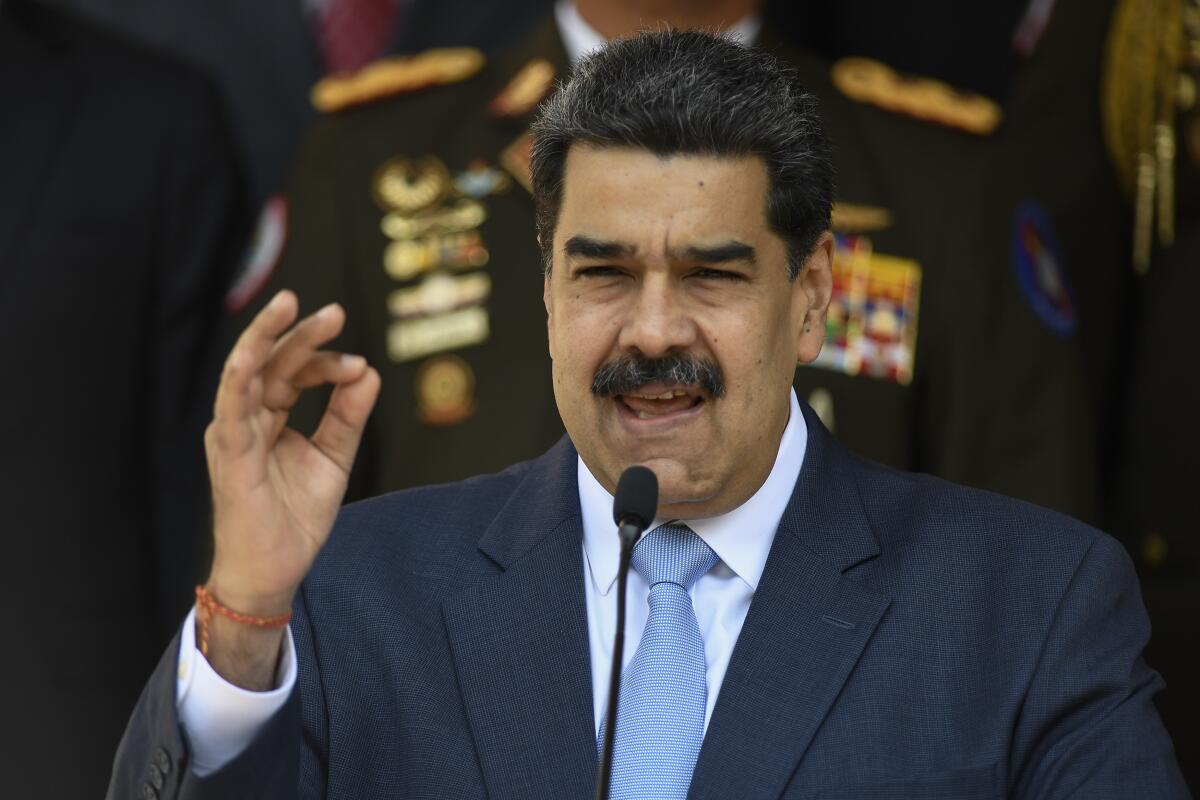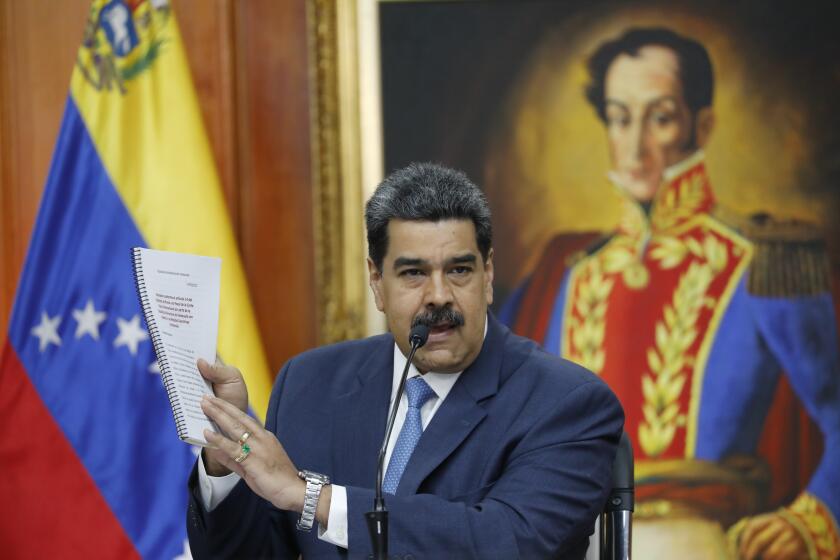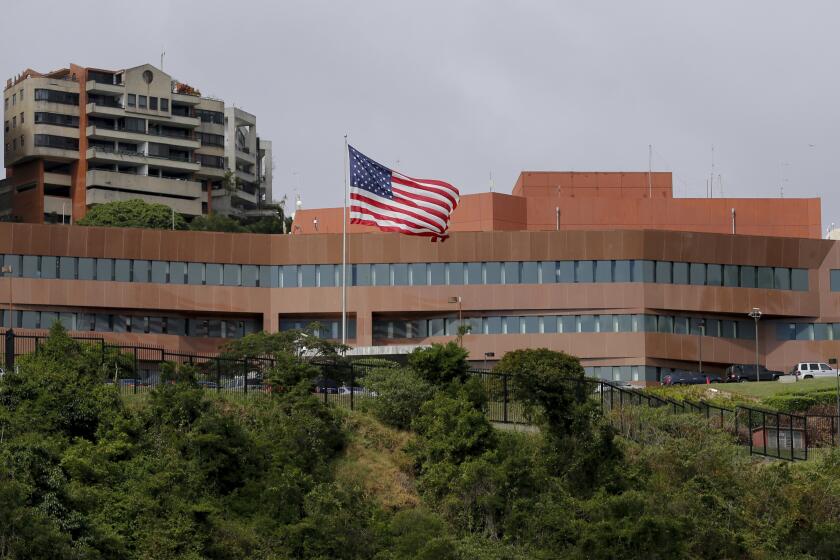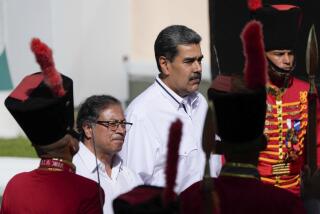Who gets the gold? Venezuela’s rival leaders clash over stash in London vault

CARACAS, Venezuela — The political battle over control of Venezuela has turned to a $1.8-billion stack of gold bars sitting in the Bank of England’s vault in London, where a judge is expected to decide soon on who has the rightful claim to the bullion.
Venezuelan President Nicolás Maduro says he needs the gold to help his cash-starved nation fight the coronavirus pandemic. But the central bank for the United Kingdom, whose government recognizes Venezuelan opposition leader Juan Guaidó as his country’s legitimate leader, has refused to hand it over to Maduro’s socialist administration.
A ruling by Justice Nigel Teare, possibly within days, could help clarify who is Venezuela’s legitimate leader — at least in the eyes of one world power, experts say.
“If Maduro is able to get his hands on this money, it weakens a significant tool that the British government has toward implementing its recognition of Guaidó,” said Michael Camilleri, a Venezuela expert at the Washington-based Inter-American Dialogue think tank. “It undermines the strength of that policy.”
The dispute hinges on the British stance toward Venezuela, a country in economic and political crisis where both Maduro and Guaidó have been claiming presidential powers for more than a year.
Britain recognizes the claim of Guaidó, as do the United States and about five dozen other governments. Guaidó, who heads Venezuela’s congress, proclaimed himself the interim president in early 2019, months after Maduro declared victory in an election that critics say was rigged in his favor.
U.S. prosecutors say Venezuelan leaders took a major stake in the drug trade in hopes of helping rebels in neighboring Colombia.
Despite its support for Guaidó, the U.K. continues to have diplomatic ties with Maduro’s government. Maduro’s appointed ambassador, Rocío Maneiro, is recognized by the British government and has control of the Venezuelan Embassy in London, while British Ambassador Andrew Soper remains in Caracas.
Britain has not granted diplomatic credentials to Guaidó’s pick as ambassador.
While Guaidó initially launched his campaign to oust Maduro with thousands of cheering supporters taking to the streets across Venezuela, the socialist president has maintained control over most branches of Venezuela’s government, including the military. Enthusiasm for Guaidó, meanwhile, has been fading.
Leigh Crestohl, an attorney representing the Central Bank of Venezuela administration appointed by Maduro, said Maduro clearly has control of the country, giving him the right to take the gold.
The U.S. diplomat has found a rare path back into Venezuela a year after leaving the South American nation amid a historical break between the two political foes.
“If a government is in de facto control of a territory, and this is recognized by the maintenance of full and normal diplomatic relations, this should be treated as formal recognition,” Crestohl said in a statement. “On our case, the law is clear.”
Maduro had asked the Bank of England for access to the gold before the coronavirus outbreak and then recently renewed the request, saying his administration would channel the money from selling the gold through an arm of the United Nations and use the funds solely to combat the pandemic in Venezuela.
Camilleri said there was widespread skepticism about Maduro’s purported plan for using the gold.
“Maduro was trying to get that money for himself before he came back with the fresh claim it was for COVID-19 relief,” Camilleri said.
Breaking News
Get breaking news, investigations, analysis and more signature journalism from the Los Angeles Times in your inbox.
You may occasionally receive promotional content from the Los Angeles Times.
Guaidó is urging the London court to order the Bank of England to withhold the gold from Maduro’s government, which it contends is illegitimate and corrupt. During a recent four-day hearing, Guaidó’s lawyers reiterated the argument that he became Venezuela’s rightful leader under provisions of the country’s constitution. They dismissed the continued diplomatic ties between London and Maduro as irrelevant.
Venezuela was once among Latin America’s wealthiest nations, sitting atop the world’s largest oil reserves. Critics of the socialist government blame corruption and mismanagement for destroying its oil industry and the wide economy.
Maduro blames the country’s ills on what he says is an economic war led by the United States, and he accuses Washington of imposing crippling sanctions in an attempt to take over Venezuela by blocking his ability to sell Venezuelan oil. He enjoys international support from countries that include China, Russia, Cuba, Iran and Turkey.
More to Read
Sign up for Essential California
The most important California stories and recommendations in your inbox every morning.
You may occasionally receive promotional content from the Los Angeles Times.












